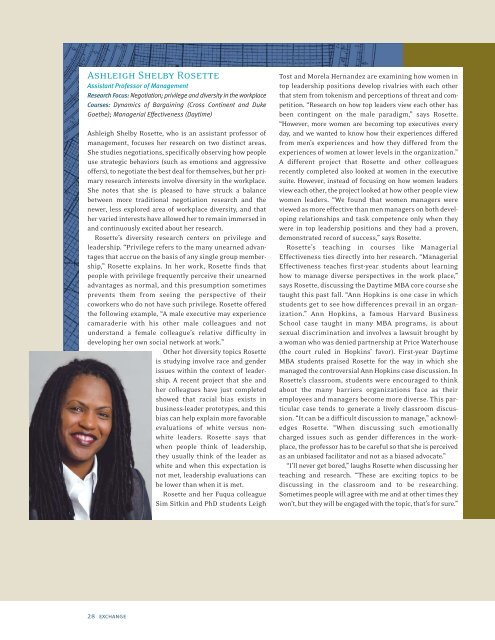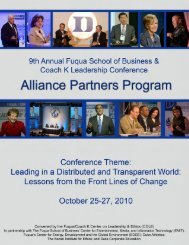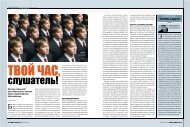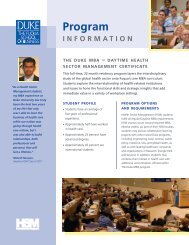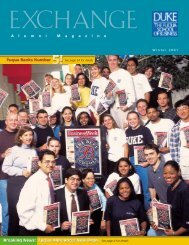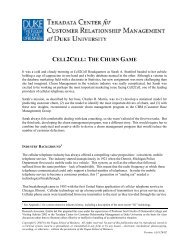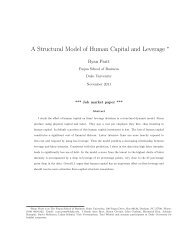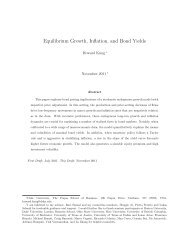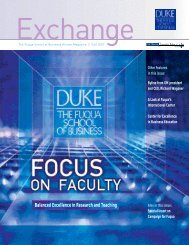Douglas T. Breeden - Duke University's Fuqua School of Business
Douglas T. Breeden - Duke University's Fuqua School of Business
Douglas T. Breeden - Duke University's Fuqua School of Business
Create successful ePaper yourself
Turn your PDF publications into a flip-book with our unique Google optimized e-Paper software.
Ashleigh Shelby Rosette<br />
Assistant Pr<strong>of</strong>essor <strong>of</strong> Management<br />
Research Focus: Negotiation; privilege and diversity in the workplace<br />
Courses: Dynamics <strong>of</strong> Bargaining (Cross Continent and <strong>Duke</strong><br />
Goethe); Managerial Effectiveness (Daytime)<br />
Ashleigh Shelby Rosette, who is an assistant pr<strong>of</strong>essor <strong>of</strong><br />
management, focuses her research on two distinct areas.<br />
She studies negotiations, specifically observing how people<br />
use strategic behaviors (such as emotions and aggressive<br />
<strong>of</strong>fers), to negotiate the best deal for themselves, but her primary<br />
research interests involve diversity in the workplace.<br />
She notes that she is pleased to have struck a balance<br />
between more traditional negotiation research and the<br />
newer, less explored area <strong>of</strong> workplace diversity, and that<br />
her varied interests have allowed her to remain immersed in<br />
and continuously excited about her research.<br />
Rosette’s diversity research centers on privilege and<br />
leadership. “Privilege refers to the many unearned advantages<br />
that accrue on the basis <strong>of</strong> any single group membership,”<br />
Rosette explains. In her work, Rosette finds that<br />
people with privilege frequently perceive their unearned<br />
advantages as normal, and this presumption sometimes<br />
prevents them from seeing the perspective <strong>of</strong> their<br />
coworkers who do not have such privilege. Rosette <strong>of</strong>fered<br />
the following example, “A male executive may experience<br />
camaraderie with his other male colleagues and not<br />
understand a female colleague’s relative difficulty in<br />
developing her own social network at work.”<br />
Other hot diversity topics Rosette<br />
is studying involve race and gender<br />
issues within the context <strong>of</strong> leadership.<br />
A recent project that she and<br />
her colleagues have just completed<br />
showed that racial bias exists in<br />
business-leader prototypes, and this<br />
bias can help explain more favorable<br />
evaluations <strong>of</strong> white versus nonwhite<br />
leaders. Rosette says that<br />
when people think <strong>of</strong> leadership,<br />
they usually think <strong>of</strong> the leader as<br />
white and when this expectation is<br />
not met, leadership evaluations can<br />
be lower than when it is met.<br />
Rosette and her <strong>Fuqua</strong> colleague<br />
Sim Sitkin and PhD students Leigh<br />
28 exchange<br />
Tost and Morela Hernandez are examining how women in<br />
top leadership positions develop rivalries with each other<br />
that stem from tokenism and perceptions <strong>of</strong> threat and competition.<br />
“Research on how top leaders view each other has<br />
been contingent on the male paradigm,” says Rosette.<br />
“However, more women are becoming top executives every<br />
day, and we wanted to know how their experiences differed<br />
from men’s experiences and how they differed from the<br />
experiences <strong>of</strong> women at lower levels in the organization.”<br />
A different project that Rosette and other colleagues<br />
recently completed also looked at women in the executive<br />
suite. However, instead <strong>of</strong> focusing on how women leaders<br />
view each other, the project looked at how other people view<br />
women leaders. “We found that women managers were<br />
viewed as more effective than men managers on both developing<br />
relationships and task competence only when they<br />
were in top leadership positions and they had a proven,<br />
demonstrated record <strong>of</strong> success,” says Rosette.<br />
Rosette’s teaching in courses like Managerial<br />
Effectiveness ties directly into her research. “Managerial<br />
Effectiveness teaches first-year students about learning<br />
how to manage diverse perspectives in the work place,”<br />
says Rosette, discussing the Daytime MBA core course she<br />
taught this past fall. “Ann Hopkins is one case in which<br />
students get to see how differences prevail in an organization.”<br />
Ann Hopkins, a famous Harvard <strong>Business</strong><br />
<strong>School</strong> case taught in many MBA programs, is about<br />
sexual discrimination and involves a lawsuit brought by<br />
a woman who was denied partnership at Price Waterhouse<br />
(the court ruled in Hopkins’ favor). First-year Daytime<br />
MBA students praised Rosette for the way in which she<br />
managed the controversial Ann Hopkins case discussion. In<br />
Rosette’s classroom, students were encouraged to think<br />
about the many barriers organizations face as their<br />
employees and managers become more diverse. This particular<br />
case tends to generate a lively classroom discussion.<br />
“It can be a difficult discussion to manage,” acknowledges<br />
Rosette. “When discussing such emotionally<br />
charged issues such as gender differences in the workplace,<br />
the pr<strong>of</strong>essor has to be careful so that she is perceived<br />
as an unbiased facilitator and not as a biased advocate.”<br />
“I’ll never get bored,” laughs Rosette when discussing her<br />
teaching and research. “These are exciting topics to be<br />
discussing in the classroom and to be researching.<br />
Sometimes people will agree with me and at other times they<br />
won’t, but they will be engaged with the topic, that’s for sure.”


